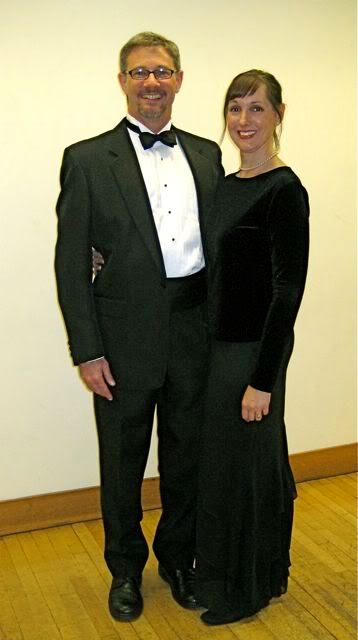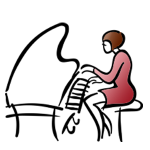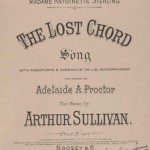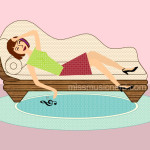Musical magic sneaks up on me when I least expect it!
I can be rather jaded and cynical when it comes to music; it’s an occupational hazard, and a common side effect of too many years of music grad school. Depending on how ornery a mood I’m in, a mere second or two of a kind of music I don’t care for can get my eyes rolling back in my head. I can diss that tune in 3 notes, Tom.
So I’m always relieved to be reminded that my cynicism is actually just a thin veneer, and it takes but little to reveal the soft, gooey center underneath. Click Mr Readmore for a few examples.
 Looking rather elegant in our concert garb!
Looking rather elegant in our concert garb!
McDoc and I have joined a choral group, and we had our first performance of the season yesterday. To be honest, I felt rather lukewarm toward the music on the program at the beginning of the rehearsal phase, and though it grew on me as the performance neared, I still wasn’t 100% gung-ho about it going into the weekend. The dress rehearsal helped; being on a real stage with an orchestra and everything, as opposed to in a dry rehearsal hall with a digital piano, always makes a huge difference.
But the magic didn’t really arrive until after 3 p.m. on Sunday. Our esteemed director made the just-right amount of onstage remarks introducing each piece, and his intense energy and enthusiasm lit a fire that spread to the rest of the stage once we started singing.
It’s hard to sing when you start to get verklempt. 🙂
This morning, I was doing some work on the computer while the local classical station played in the background. All of a sudden my ears pricked up as some intensely familiar piano music came on: two of Chopin’s Ballades that I played when I was an undergrad. I confess that I can no longer fit in the kind of practice time needed to keep a Chopin Ballade in any kind of adequate shape, but hearing the music instantly transported me back to the time when I was playing it regularly. I spent the summer after my sophomore year practicing my brains out on this piece, and still never got it to the level I hoped for. Hearing it is always bittersweet. This morning, it stopped me in my tracks, bringing up a every regret and misgiving I’ve ever had about this hare-brained endeavor known as being a professional musician. Verklempt once again!
This topic always reminds me of when I saw Donnie Darko in the theatre. I had to be dragged to it by a guy I was dating at the time, but as I sat there and heard that Echo and the Bunnymen song under the opening scene, it was like I’d been kicked in the gut: I was back in high school, wearing black, smoking cloves (didn’t inhale, really!!) and writing bad poetry.
So how, and more importantly why, does music academia suppress these kinds of reactions, and sow the seeds of cynicism in the hearts of its earnest denizens? Well, I won’t take the time to ponder the why at the moment, but here’s a little anecdote relating to the how:
I remember once taking a seminar on music cognition, which is a subdiscipline of music that draws on psychology, neuroscience, philosophy, and linguistics, among other fields. During one session, there was a discussion regarding the phrase “musical language,” a term which is often used to describe a particular composer’s music; it could be roughly translated to something like “style.” Most of my colleagues objected to the term as being squishy and inexact, because music doesn’t have syntax and fixed meaning the way verbal language does; the meaning we ascribe to it is culturally assigned and developed. Are you bored yet? Me, too.
Around this same time, I was performing with a friend of mine as part of outreach activities for the university’s music library — activities which were conspicuously not associated in any way with the music department itself. We would go around to schools, public libraries, senior centers, etc., and play all kinds of wacky music on toy instruments, I on a little toy piano reminiscent of Schroeder, and my friend on a variety of wind and percussion instruments, both miniature and full-sized (his nose whistle playing was particularly memorable).
Our big money number, though, was an arrangement of Saint-Säens “The Swan” for toy piano and English Horn. (It was even more beautiful than this version.) Quite often when we played it, people in the audience would cry. I was playing this tinkly little piano, sitting on a ridiculous little stool on the floor, but still, people cried.
Music intellectuals can sit around seminar tables and bloviate on what music is and isn’t all they want, but when the rubber meets the road, people respond to music in a way that can be neither faked nor dismissed. And there are certain pieces that get me every time. “Sucker!” I say to myself. And I rejoice. 🙂




